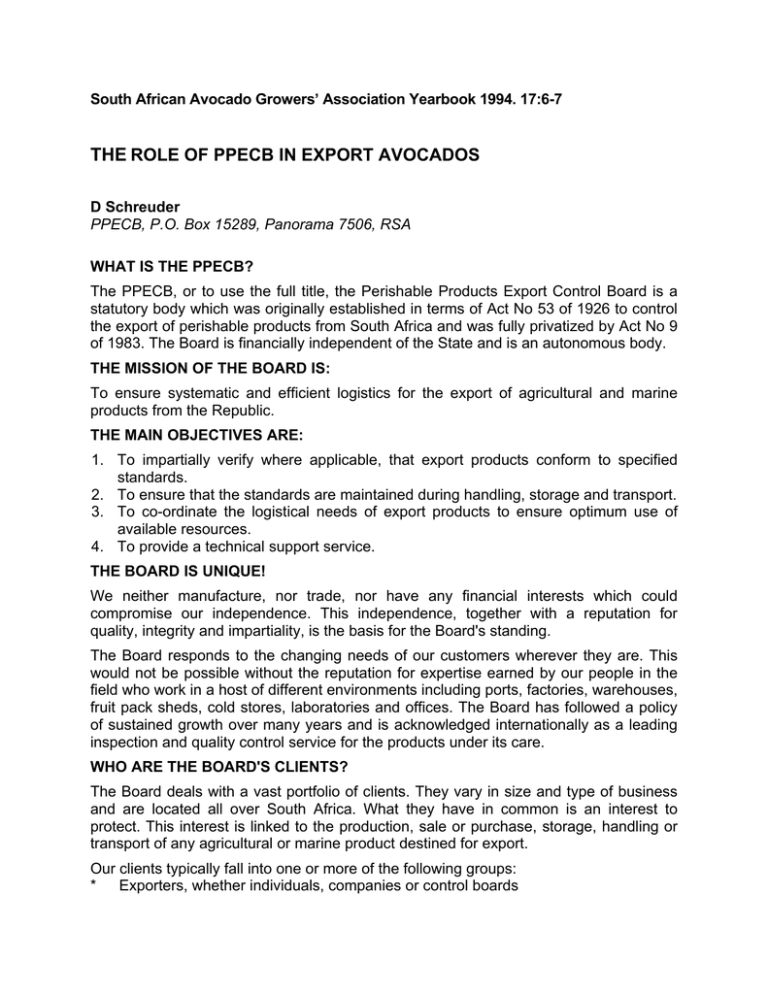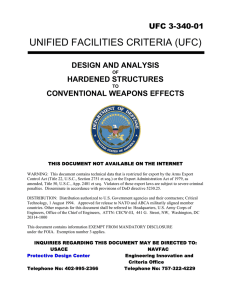THE ROLE OF PPECB IN EXPORT AVOCADOS
advertisement

South African Avocado Growers’ Association Yearbook 1994. 17:6-7 THE ROLE OF PPECB IN EXPORT AVOCADOS D Schreuder PPECB, P.O. Box 15289, Panorama 7506, RSA WHAT IS THE PPECB? The PPECB, or to use the full title, the Perishable Products Export Control Board is a statutory body which was originally established in terms of Act No 53 of 1926 to control the export of perishable products from South Africa and was fully privatized by Act No 9 of 1983. The Board is financially independent of the State and is an autonomous body. THE MISSION OF THE BOARD IS: To ensure systematic and efficient logistics for the export of agricultural and marine products from the Republic. THE MAIN OBJECTIVES ARE: 1. To impartially verify where applicable, that export products conform to specified standards. 2. To ensure that the standards are maintained during handling, storage and transport. 3. To co-ordinate the logistical needs of export products to ensure optimum use of available resources. 4. To provide a technical support service. THE BOARD IS UNIQUE! We neither manufacture, nor trade, nor have any financial interests which could compromise our independence. This independence, together with a reputation for quality, integrity and impartiality, is the basis for the Board's standing. The Board responds to the changing needs of our customers wherever they are. This would not be possible without the reputation for expertise earned by our people in the field who work in a host of different environments including ports, factories, warehouses, fruit pack sheds, cold stores, laboratories and offices. The Board has followed a policy of sustained growth over many years and is acknowledged internationally as a leading inspection and quality control service for the products under its care. WHO ARE THE BOARD'S CLIENTS? The Board deals with a vast portfolio of clients. They vary in size and type of business and are located all over South Africa. What they have in common is an interest to protect. This interest is linked to the production, sale or purchase, storage, handling or transport of any agricultural or marine product destined for export. Our clients typically fall into one or more of the following groups: * Exporters, whether individuals, companies or control boards * * * * * * * Suppliers and producers of products Traders or buying agents Export agents Freight carriers, land, air and sea Governments and related agencies Insurance institutions Owners and operators of commercial cold stores HOW IS THE BOARD STRUCTURED? In terms of the Board's charter, the six major export groups are each entitled to appoint a person to represent their interests on the Board, and any exporter or export group who exports more than 20 % of the total exports is entitled to appoint a second representative. In addition, the South African Agricultural Union and the Minister of Agriculture each appoint a representative. The Board as it is then constituted elects the Chairman and Vice-Chairman. The current Board Members are: Chairman Dr SJJ van Rensburg SAAU Vice-Chairman Mr CA Atkins Fishing Industry Members Mr D Gant Deciduous Industry Mr LB Kriel Deciduous Industry Mr SF Kotze Ministerial Representative Mr HV Lombard Meat Industry Mr DC Letter Citrus Industry Mr FJ Lourens Sub-Tropical Industry Mr JW Louw Vegetable Industry Dr DA Stanton Citrus Industry The Board has its Head Office in its own building in Cape Town. The activities of the Board are controlled by the General Manager who is the Chief Executive of the Board. The Board is organised into Departments, each of which has specific functions and is headed by a senior manager who together with the General Manager, comprise the senior management team. This team has overall responsibility for amongst others: Directing the Board's planning and future growth, and Monitoring performance, financially, operationally and technically, of the activities of the Board country wide. WHAT DOES THE BOARD OFFER IT'S CLIENTS? The Board has a multitude of services which it provides to clients. These have all been grouped in terms of the main functions of the Board. The Board's departmental organisation is designed to conform to the functions of the Board, so for example the first main function is in fact the mission of the Agricultural Product Standards Department and so on. The Department concerned is indicated for ease of reference. AGRICULTURAL PRODUCTS STANDARDS DEPARTMENT To impartially verify where applicable, that export products conform to specified standards. This will include amongst others: The inspection on plant and animal products prior to export to ensure compliance with prescribed grading, packing and marking specifications. The creation of export certificates, the generation of reports on inspection results, including rejections and other such information as may be required. The drawing of samples for submission to laboratories for analysis to ensure that both local and international chemical residue limits are adhered to. OPERATIONS DEPARTMENT To ensure that the standards are maintained during handling, storage and transport and to co-ordinate the logistical needs of export products to ensure optimum use of available resources. In order to fulfill this function the Department will amongst others: Ensure that the vessel, container, RMT, or Cold Store is suitable for carriage and/or storage of perishable cargo. Verify the ship's plan to ensure that products will be correctly stowed on the basis of the booking in terms of temperature and taint. Ensure that the product remains within the Time Temperature Tolerance (TTT) during transport and/or handling and at the correct temperature during storage. Instruct vessel as to the correct temperature and handling procedures, and ensure that the vessel delivers the correct temperature during loading and direct that such temperatures are maintained after loading and during transit. Accept bookings for shipping space in order to assess the needs of exporters in regard to handling, storage and transport of products for export and where necessary, allocate such space between exporters in proportion to their demand and commitment. TECHNICAL DEPARTMENT To provide a technical support service. This will include amongst others: the maintenance of a data bank on all relevant technical information, specifications and applications, both local and international, to improve performance and reduce quality loss during handling, storage and transport. The identification of areas needing research, the encouragement of research and ensuring that such research is implemented. The evaluation of performance of equipment, procedures and product quality to identify and rectify problems in handling, storage and transport. The formulation of internationally acceptable standards and techniques to ensure optimum use of equipment and handling, storage and transport conditions. ADMINISTRATION AND FINANCE DEPARTMENT To provide financial and administrative services in support of the above objectives. WHAT IS THE IMAGE OF THE BOARD? Our professionalism is grounded firmly in: Impartiality It is essential in all of the functions we perform that our actions are objective, factual and favour neither party in a given situation. Our role is to ensure compliance with contract terms, international requirements or product specifications. Integrity The requirement precludes any activity which could or would affect our independence. This is an absolute requirement both from the Board as an organisation point of view, as well as every individual who is in the Board's service. Expertise It is the declared aim of the Board to employ only the very best person available for every post and to optimise the use of our resources in this respect. Extensive training schemes are available. It is critical that we avoid situations in which our level of skills do not meet the needs of our clients. Quality The Board has always been quality conscious and actively pursues programmes designed to constantly improve the quality of our services. It is a process which involves everyone in the Board. This results in: * * * * a better service to our clients an enhanced job satisfaction the ability to solve problems at the lowest possible level a more efficient utilisation of our resources


